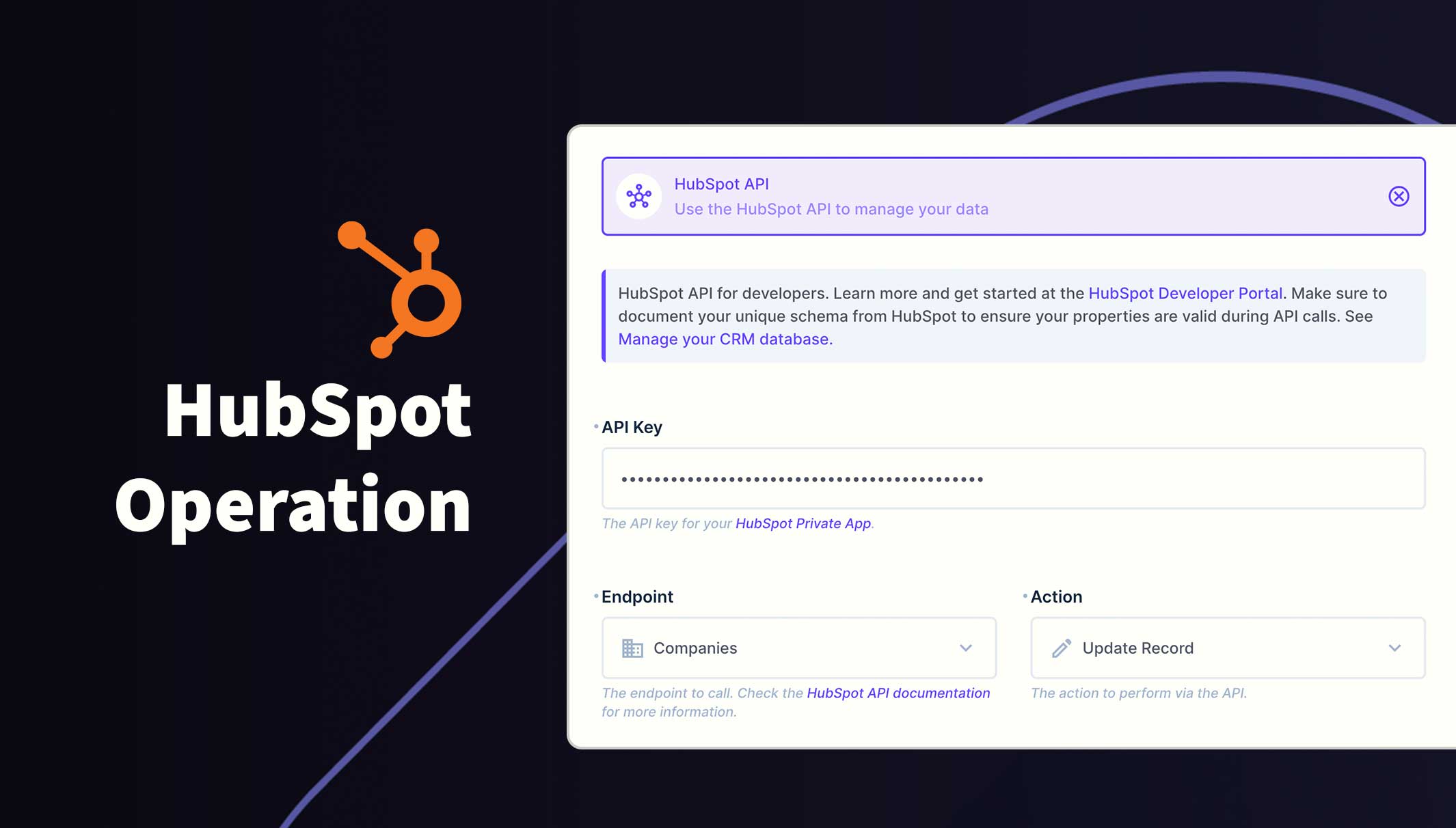
Security News
vlt Launches "reproduce": A New Tool Challenging the Limits of Package Provenance
vlt's new "reproduce" tool verifies npm packages against their source code, outperforming traditional provenance adoption in the JavaScript ecosystem.
@directus-labs/hubspot-operation
Advanced tools
Hubspot API operation for managing companies, contacts, activities, and deals.
The HubSpot Operation allows you to integrate their API into Directus flows.

/account-info/v3/activity/audit-logs/account-info/v3/activity/login/account-info/v3/activity/security/crm/v3/objects/contacts/crm/v3/objects/communications/crm/v3/objects/companies/crm/v3/objects/contacts/crm/v3/objects/deals/crm/v3/objects/email/crm/v3/objects/leads/crm/v3/objects/meetings/crm/v3/objects/notes/crm/v3/objects/products/crm/v3/objects/tasks/crm/v3/objects/ticketsRefer to the Official Guide for details on installing the extension from the Marketplace or manually.
This operation relies on the permissions of the API Access Token. Please make sure to assign the required permissions beforehand.
| Endpoint(s) | Scopes |
|---|---|
| Activity | account-info.security.read |
| Calls Communications Contacts Meetings Tasks | crm.objects.contacts.readcrm.objects.contacts.write |
| Companies | crm.objects.companies.readcrm.objects.companies.write |
| Email | sales-email-read & crm.objects.contacts.readcrm.objects.contacts.write |
| Deals | crm.objects.deals.readcrm.objects.deals.write |
| Leads | crm.objects.leads.readcrm.objects.leads.write |
| Products | e-commerce |
| Tickets | tickets |
For more detailed information about the HubSpot API and its capabilities, please refer to the HubSpot API reference.
Associations represent the relationships between objects and activities in the HubSpot CRM. Record associations can exist between records of different objects (e.g., Contact to Company), as well as within the same object (e.g., Company to Company).
When creating a new item, you can also associate the item with existing records or activities by including an associations object. For example, to associate a new contact with an existing company and email, your request would look like the following:
association: [
{
"to": {
"id": 123456 <--- ID of the existing item
},
"types": [
{
"associationCategory": "HUBSPOT_DEFINED",
"associationTypeId": 279 <---- ID of the category
}
]
}
]
Use properties to store information on CRM records. HubSpot provides a set of default properties for each CRM object, and you can also create and manage your own custom properties in the HubSpot Data Model. Check out the properties guide in HubSpot's documentation and familiarize yourself with the default properties for each endpoint.
Be mindful that some properties have fixed values that are allowed. Make sure to use these values when creating or updating records.
{
"firstname": "Jane",
"surname": "Smith",
"email": "j.smith@example.com"
}
The ID field is required when updating or deleted an item. This must be the ID of the item from HubSpot and can be fetched using the Read action or by saving the ID within Directus after creation.
A comma seperated list of properties to return in the API response. Type the field and hit return to add the property.
A comma separated list of the properties to be returned along with their history of previous values. If any of the specified properties are not present on the requested object(s), they will be ignored. Type the field and hit return to add the property.
Also known as "after", this field is used for pagination of the results. You can retrieve the paging cursor token from the previous API request on the same endpoint. The response looks like this:
"paging": {
"next": {
"after": "123456789",
"link": "https://api.hubapi.com/crm/v3/objects/contacts?limit=10&properties=firstname%2Csurname%2Cemail&after=123456789"
}
}
Note: paging will be absent if there are less results on the current page than the limit
By default this is set to 10 entries. Change this value to retrieve more or less results.
Specifiy a field to sort the results by.
The Activity endpoint has an additional datetime field. This will limit the scope of the query to the specified timeframe. Leaving these blank will default to the most recent activity.
HubSpot offer a Webhook as part of the private app which can be linked to a Directus webhook flow for a more circular workflow.
The operation will throw an error if the API returns an error response. Make sure to handle these errors appropriately in your flows.
Detailed Error responses can be found in the HubSpot private app details and within the Directus Flow log.
FAQs
Hubspot API operation for managing companies, contacts, activities, and deals.
The npm package @directus-labs/hubspot-operation receives a total of 3 weekly downloads. As such, @directus-labs/hubspot-operation popularity was classified as not popular.
We found that @directus-labs/hubspot-operation demonstrated a healthy version release cadence and project activity because the last version was released less than a year ago. It has 0 open source maintainers collaborating on the project.
Did you know?

Socket for GitHub automatically highlights issues in each pull request and monitors the health of all your open source dependencies. Discover the contents of your packages and block harmful activity before you install or update your dependencies.

Security News
vlt's new "reproduce" tool verifies npm packages against their source code, outperforming traditional provenance adoption in the JavaScript ecosystem.

Research
Security News
Socket researchers uncovered a malicious PyPI package exploiting Deezer’s API to enable coordinated music piracy through API abuse and C2 server control.

Research
The Socket Research Team discovered a malicious npm package, '@ton-wallet/create', stealing cryptocurrency wallet keys from developers and users in the TON ecosystem.